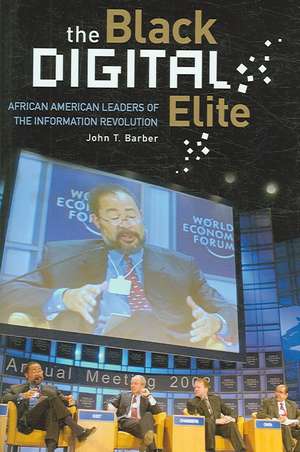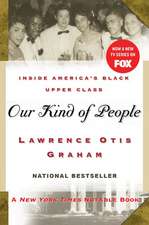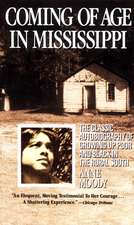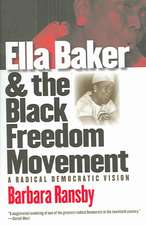The Black Digital Elite: African American Leaders of the Information Revolution
Autor John T. Barberen Limba Engleză Hardback – 29 sep 2006 – vârsta până la 17 ani
Preț: 287.19 lei
Preț vechi: 349.45 lei
-18% Nou
Puncte Express: 431
Preț estimativ în valută:
54.95€ • 57.52$ • 45.74£
54.95€ • 57.52$ • 45.74£
Carte tipărită la comandă
Livrare economică 31 martie-14 aprilie
Preluare comenzi: 021 569.72.76
Specificații
ISBN-13: 9780275985042
ISBN-10: 0275985040
Pagini: 216
Dimensiuni: 156 x 235 x 21 mm
Greutate: 0.48 kg
Editura: Bloomsbury Publishing
Colecția Praeger
Locul publicării:New York, United States
ISBN-10: 0275985040
Pagini: 216
Dimensiuni: 156 x 235 x 21 mm
Greutate: 0.48 kg
Editura: Bloomsbury Publishing
Colecția Praeger
Locul publicării:New York, United States
Notă biografică
John T. Barber is the Deputy Chief Learning Officer of the Ballistic Missile Defense University in Washington, D.C., and an Adjunct Professor in the Communications Department at George Mason University in Fairfax, Virginia. Dr. Barber has over twenty-five years of experience as a media analyst, communications educator and scholar and broadcasting practitioner. His previous book, The Information Society and the Black Community (Praeger, 2000), was one of the first to provide a comprehensive examination of the prospects and pitfalls of a historically disadvantaged group in a period of rapid technological advances and economic growth in America.
Recenzii
[T]his book opens the window to the leadership role of African Americans in the digital arena. Barber offers a way to examine the relationship between African Americans and the Information Revolution. He also reminds his readers that considering the internet a white technology ignores the contributions and complexities in African Americans' relationship to the new digital media.
Barber provides profiles of 26 African Americans who are leaders in the information industry, including computer scientists, policymakers, educators, entrepreneurs, mathematicians, analysts, developers, activists, and businesspeople. He describes the contributions and lives of innovators such as Roy L. Clay, Sr., Clarence (Skip) Ellis, Ronald H. Brown, Congressman Bobby L. Rush, Reverend Jesse Jackson, Dhyana Ziegler, Robert L. Johnson, and Kenn Turner.
[B]arber provides over two dozen biographical essays on prominent Black politicians, computer scientists, educators, and entrpreneurs who have in one way or another contributed to the development of computer technology and its applications in American society..The topic of information technology and the African American community is important, especially as the digital divide becomes a more and more significant challenge for economically stressed areas of our cities and countryside. Barber's The Black Digital Elite will serve as a valuable summary of the part African Americans have played so far in the information revolution.
[S]hows that African Americans are far from just being passive consumers and access-starved bystanders to the construction of the Information Superhighway and now, the data-sphere..This book is one-of-a-kind in important ways. After reading this book, give it to the nearest gamers and/or constantly IMing teens right away. It'll immediately broaden their horizons with ideas--perhaps on what to do with those gadgets.
[B]arber profiles twenty-six African Americans who have made significant contributions to the advancement of technology over the past four decades. From inventors to CEOs, educators to policy-makers, the compilation of perhaps unfamiliar names and faces adds richness to the history of technological innovation. Beyond the biography, each profile includes an insightful discussion about the digital divide, its persistence and how African Americans can create new paradigms for themselves in order to bridge the gap.
Despite talk of a digital divide along lines of race and class, media analyst Barber asserts that African Americans have been actively involved in the development and progress of information technology. He offers profiles of 26 black Americans who have made significant contributions to the advancement of technology..Barber highlights black scientists, policy makers, educators, and entrepreneurs who have advanced technological development in the U.S. Barber also illustrates how many of those he profiles are using information technology to address social issues.
Barber provides profiles of 26 African Americans who are leaders in the information industry, including computer scientists, policymakers, educators, entrepreneurs, mathematicians, analysts, developers, activists, and businesspeople. He describes the contributions and lives of innovators such as Roy L. Clay, Sr., Clarence (Skip) Ellis, Ronald H. Brown, Congressman Bobby L. Rush, Reverend Jesse Jackson, Dhyana Ziegler, Robert L. Johnson, and Kenn Turner.
[B]arber provides over two dozen biographical essays on prominent Black politicians, computer scientists, educators, and entrpreneurs who have in one way or another contributed to the development of computer technology and its applications in American society..The topic of information technology and the African American community is important, especially as the digital divide becomes a more and more significant challenge for economically stressed areas of our cities and countryside. Barber's The Black Digital Elite will serve as a valuable summary of the part African Americans have played so far in the information revolution.
[S]hows that African Americans are far from just being passive consumers and access-starved bystanders to the construction of the Information Superhighway and now, the data-sphere..This book is one-of-a-kind in important ways. After reading this book, give it to the nearest gamers and/or constantly IMing teens right away. It'll immediately broaden their horizons with ideas--perhaps on what to do with those gadgets.
[B]arber profiles twenty-six African Americans who have made significant contributions to the advancement of technology over the past four decades. From inventors to CEOs, educators to policy-makers, the compilation of perhaps unfamiliar names and faces adds richness to the history of technological innovation. Beyond the biography, each profile includes an insightful discussion about the digital divide, its persistence and how African Americans can create new paradigms for themselves in order to bridge the gap.
Despite talk of a digital divide along lines of race and class, media analyst Barber asserts that African Americans have been actively involved in the development and progress of information technology. He offers profiles of 26 black Americans who have made significant contributions to the advancement of technology..Barber highlights black scientists, policy makers, educators, and entrepreneurs who have advanced technological development in the U.S. Barber also illustrates how many of those he profiles are using information technology to address social issues.













